|
Throughout this spring semester, there is no doubting that college students hit hard with the Covid-19 pandemic. It resulted in many extenuating circumstances which we did not expect. Student athletes were stripped of the remaining of their winter seasons, along with their current spring season. As we discussed in week 3 of “The Warrior Voice,” seniors were hit the hardest with this pandemic. But what about our underclassmen and rising seniors? How has this pandemic affected them? And I wondered how teams are staying together without traditional workouts, meetings, etc. Obviously, it is virtual right now, but let’s see what this week's Warrior Voice participants had to say…
In this last edition of “The Warrior Voice” I had a chance to catch up with David Akinwande from men’s football and Mandy Fine from women's cross country. The biggest change to college students was the shift to online classes. Some students may already have been taking courses online, while many were new to the change of scenery. With it being the start to finals week, I figured David and Mandy could give a great perspective of how the online semester shift impacted them. I first asked David and Mandy “What were your thoughts on shifting to online classes the rest of this semester?” Both athletes went on to describe how they adjusted well but were not a fan of online in comparison to in person education. David began by saying, “At first it felt so surreal but to be honest, adjusting to it wasn’t that bad. The transition gets a little tricky depending on certain majors. Personally, I do not prefer online classes because with being a nursing major I wasn’t able to have my face to face clinicals where I get my full nursing experience”. Mandy also added, “I was a little upset but understood why everything happened the way it happened. My time management became a huge benefit so I could get my work done efficiently.” I think it was interesting both athletes preferred the in-person classes considering our generation is known for being so tech savvy. Me being a Digital Media Technologies major, did not really have a problem with the online shift. As David mentioned, depending upon major, this sudden online shift affected some more than others. Next, I asked David and Mandy “What ways have you tried to stay focused throughout the semester while working from home?” These responses were interesting, as both athletes tried to break down their routine throughout the semester. Mandy answered by saying, “I made a daily schedule where I would go for my run before class, and after sitting through my zoom classes I would complete any school work I have, so that the rest of the day would go to relaxation or other activities to help brighten my mood.” David also added “I would normally get up at my regular class times and have a list of important tasks for the week and upcoming weeks. Using this list to cross off the task as I completed each one to help me stay focused and on task.” I thought these were great routines and commended both on the positive mindsets to help guide them! Both student athletes obviously expressed sadness from losing this spring semester, and if you remember in week 3 (titled) “Seniors We Love You!” there were positive messages and lessons expressed. In this week's post, I wanted to get the perspective of returning athletes, so I then asked, “What are some things this sudden virtual shift taught you?” [David] “This shift showed how quickly we can adapt to situations like this, and gave me a different level of appreciation for the professors who made the way for us to have an online curriculum to still have success this semester.” Mandy added “Firstly, the shift taught me to not take anything for granted, but also that I work better hands on and while interacting with others. I like to be busy at all times, but the whole pandemic just freed up a lot of time for me.” I highlighted when David mentioned the level of appreciation for the professors. I think this was overlooked throughout the process. Everyone talked about how tough it was for students, but the professors worked tirelessly to adapt and create a fluid online curriculum with little time. I certainly appreciate the time our professors put in throughout this sudden shift to help make this process as simple as possible. Throughout this whole thing, I also wondered how it has been with keeping in contact with teammates and coaches. Returning athletes certainly still have upcoming seasons to prepare for even though they are home. To get their input, I asked David and Mandy “How has it been staying in contact with coaches and teammates?” [Mandy] “For Cross Country, we all are very close, so we zoom video chat all the time and have a very active group chat. Coach Koch calls in from time to time to make sure we are okay with everything, so overall it's been well!” David also discussed his football meeting routine. “We all have group chats together and still have weekly meetings as well as academic checks so our communication within each other has not died down at all.” I think communication is huge throughout the whole pandemic, and I was elated to hear that both athletes are in good communication with their respective teams to stay prepared for next season. Speaking of preparing for the upcoming season, how has staying in shape been for these athletes? All over social media there have been many different creative at-home workout strategies, but of course everyone is indeed different. So of course, I asked “How are you staying in shape for your sport?” [David] “My workout routine consists of waking up early (7am) and luckily I have workout equipment in my basement including a squat rack. So I would use our winter workout plan to maintain strength and to incorporate that I would run around my block to build my endurance. And of course, nutrition is still important in all of this, I have to make sure I am getting the correct amount of fuel, so my body is prepared for the fall season, lord willing. Amanda finished off our discussion with her running schedule. “Simply for me, I put a run or workout in my schedule. Depending upon the weather, I go for runs every morning along the nice trails we have here!”. Although this pandemic was an unexpected challenge, I believe it was a great test. Individuals across the country have been affected, but as mentioned in week 3 “Seniors We Love You!”, this could be setting us up for something greater down the line! David Akinwande is a Sophomore Fullback from Bristol, Pa majoring in nursing who is coming off an all-region season as a redshirt freshman. He looks to help lead the Warriors as they build off last year's winning season. Amanda Fine is a Junior distance runner from Stevensville, MD majoring in communication sciences and disorders. Both athletes have high hopes for a fall season with the Covid-19 pandemic currently in effect. I enjoyed my conversation with both Amanda and David about how they work through Covid, and I ensure their perspectives were interesting to many. Like I stated earlier, everyone’s routine is certainly not the same, and I do commend both for finding ways to continue their success as a Warrior! As we close out the semester this week, I want to thank all the athletes that helped participate to help make this platform possible! I can ensure this will not be the last post, and many other athletes will be able to give their voice in the future! As always, I had a blast this week, and I hope you all stay tuned for what the future holds with “The Warrior Voice”! *** The warrior athletes, Student Athlete Advisory Committee, and athletic department faculty would like to give our sincere thanks to Jamal Cooley who has authored the Warrior Voice. He shined on the football field, the track and in the classroom during his time in East Stroudsburg. He also made another lasting impact when he pioneered “The Warrior Voice” and certainly made sure our student athletes were heard. Thank you, Jamal! ***
0 Comments
As collegiate student-athletes, there are a lot of positives that sometimes go unrecognized. There are great performances that don’t show up in the stat sheet. Likewise, off the field work like community service are frequently unnoticed. Do relationships with our teammates, coaches and mentors fall in that same category?
This week on “The Warrior Voice” I had the time to catch up with Colby Stichter from men’s soccer, and Kayleigh Pokrivka from women's lacrosse. We discussed the impact and importance of building relationships with teammates, coaches and mentors. Frequently, people on the outside only see what happens on game-day. Win or lose, no one really knows what's going on inside of a team except for that team itself. On both sports teams I've been a part of at ESU (football & track), I’ve always found it advantageous to have a strong relationship with teammates, coaches, and even mentors I met along my journey. Because of my experiences, I wanted to get different perspectives from these 2 well driven athletes! When we think of the word relationship, a soulmate or significant other may immediately come to mind. To warrior student athletes, the word has more meaning to it. I started by asking each athlete what defines a good relationship? Colby started by saying, “I think of mutual respect and care for each other, where you can trust them while also wanting the best for them. So in my eyes a relationship with a friend, coach, or anybody consists of them wanting to see you succeed while doing what they can to help you along the way.” Kayleigh also added “A relationship to me would be a feeling or sense of closeness and trust with someone; Having that ability to confide with a certain level of trust”.” I was able to note how both athletes mentioned “trust”, which I believe is essential when building relationships! Furthermore, I asked how important they would say the overall building of relationships with teammates is? Both athletes mentioned many interesting factors that helped contribute to the positives of good relationships with our athletic peers. “Relationships with teammates are very important because they relate directly to how you play on the field. If you have a good relationship with your teammates, I believe you’re more likely to have a better season and better outcomes.”, Kayleigh stated. Colby went on to say “The relationships with teammates are huge! On the field, you need that sense of chemistry and connection on the field, because without that we would be playing on the soccer field as 11 guys and not 1 team. Forming relationships with my teammates helped me learn a lot from the upperclassmen to help me become better and more importantly, helped us become better as a team.”. I liked how Colby mentioned chemistry, which can be key to team success in my opinion. Colby also stated, “If a team works together, they are going to out perform a team that might be more individually talented than them.” Kayleigh added, “Building chemistry is an important aspect for team success because you need to have that trust in each other on the field.” Kayleigh also mentioned how her team built chemistry off the field with extracurricular activities like movies. Like myself, both athletes believe that chemistry is an essential tool to team success. Relationships I’ve built with teammates have affected me in numerous ways. Upperclassmen that served different leadership roles have had a positive effect on me based on the relationship I’ve built with them. I can proudly say I’ve gotten more involved on campus and come out of my comfort zone as a result of these relationships. I next asked Kayleigh and Colby how the relationships they’ve built with teammates influenced them? Kayleigh started by saying “I’ve made my best friends from having a strong relationship with my teammates and our strong relationships push me to work harder because I know they are counting on me and trust me as a teammate and as a person”. I noted how Kayleigh reverted to trust, which as mentioned earlier, is something that wants to be gained in a relationship with teammates. Colby went on to state, “The relationships I’ve built with teammates have carried an effect on me by creating the teammate I am today. I’ve had, and have teammates that helped me along the way and showed me the ropes. All this installed certain beliefs into me that I should help those coming up and make connections to continue to bring everyone together as a family.” Both athletes revealed positive effects from the relationships built with teammates, and I applaud them both Throughout our years of playing sports, we experience many different coaches. The games we play would not be the same without the coaches who help us become better each day. I have built a great relationship with my current football and track coaches at ESU, and these relationships have helped open doors for the future. Having that strong relationship with my coaches is a result of them helping me become a better person off the football field & track because they care about me as a young man. They understand that who I am off the field and track is more important than who I am in competition. When flipping the script to relationships with coaches, I first ask the importance of a relationship with coaches within the student-athlete? Colby started the conversation by mentioning finding the balance between coach and friend. “I think finding a good balanced relationship with your coach is important because you definitely want to be on the same page and trust to know you are being guided correctly.” I mentioned to Colby about this being important in terms of being coachable as well. Kayleigh also added “(The) relationship with your coach is incredibly important because you gain trust to know they are doing what's best for the team, and a good relationship ensures that that is happening! Coaches always know what's best in the long run and everything they do has a purpose and meaning so you have to have the level of trust to follow through.”. Both athletes also went on to talk about the effects that their coaches have had on them through the relationship they’ve built. “I’ve never had a woman coach till I got here at ESU, which kinda gave me someone who is feminine and successful as a coach to look up to in our sport.” Kayleigh stated. Colby then touched on an old high school coach who had an everlasting effect on him. “Back in high school when I was also a track athlete, I found that the relationship with my distance coach gave me the drive to fight for every teammate and coach I play with and play for. The effort he put into us instilled a reciprocated idea in me.” I related to Colby with the relationship I had with my old pop warner coach. Most of my wanting to give back has come from his ways and values that were carried on throughout his legacy back home in Philadelphia. I think both athletes certainly had interesting effects on relationships with coaches! I also asked Colby and Kayleigh about mentors and if they minded sharing who has had a great effect on them as a mentor. Colby is coming off of an ACL tear and spoke on his athletic trainer (Alex Davisson, an ESU athletic training graduate assistant from Delaware) who mentored him throughout the recovery process as well as his teammate who shares the same major as him. “I was redshirted this year, so during the fall she was there to guide me along the way, and I felt her being a mentor of keeping me in shape while pushing me to certain limits. With my teammate Riley Lougee being an education major as well, he really created a great relationship by helping and showing me the ropes with certain things academically.” Kayleigh added how she saw Dr. Matt Miltenberger as a mentor with strength and conditioning while at ESU. “I never lifted before I came to ESU, so following his program guided me in the right way for college sports. Over the summer he helped me extremely with getting my shoulder strength back to the strength I used to have and he’s always there if you need to talk!” Throughout the conversations I’ve had with these 2 well rounded student-athletes, it was interesting to hear a different perspective on relationships that were built while playing their respective sports. In conclusion, both athletes described their best memory at ESU where the relationship with a teammate, coach or mentor played a crucial role. Colby discussed the day he was finally cleared to practice, following his ACL surgery. “I came to practice about 10 mins late after my doctor appointment and I looked over smiling to my friend Eric and the rest of the team just knew. Everyone was hype and clapping that I had been cleared and to have them behind me throughout that whole recovery meant a lot.”. Colby Stichter is a redshirt sophomore midfielder majoring in Math and Spanish with a Secondary Education concentration. Colby made 7 game appearances his freshman season and is looking to make a huge comeback after successfully recovering from his ACL injury. Kayleigh concluded by telling about an experience her freshman year of how the team chemistry helped them soar as regional champions. “I remember wanting to work for our captains and seniors because they put so much effort into making sure we were all on the same page and that we trust each other. The feeling after that win was surreal because we knew we played our hearts out together and our chemistry was unmatched.” Kayleigh “KP” Pokrivka is a Junior defensive player majoring in Nursing. Kayleigh has had an exceptional career. As mentioned, she was a part of the 2018 Regional Champion team, achieving 1st Team All-Psac and IWLCA All-Atlantic Region 1st Team. I thank both Kayleigh and Colby for participating in “The Warrior Voice” this week and as always, I had a blast catching up with them. The relationships we build with teammates, coaches, and mentors can indeed have a positive impact on us and I hope these perspectives were touching to many! I hope everyone is still staying strong, safe, and healthy throughout the current pandemic. I thank everyone for the support throughout this platform, and of course, stay tuned for week 5! *First and foremost, I am in full understanding of health being first as a result of these cancellations and am not by any means using this platform as a protest or petition in any way. Everything spoke of in this article is words of encouragement and positivity towards those who were devastated from not being able to compete this semester.*
In this week's edition of “The Warrior Voice” I took the time to chat with Senior student-athletes Anthony Torreullas and Marina Zardet. This week, I chose to name the topic “Seniors, We Love You” to bring positivity and encouragement to the Seniors across the Warrior family that were forced to discontinue the current and upcoming spring seasons due to the CoronaVirus Pandemic. Me being a Senior myself, my spring track season was cut short due to a knee injury occurring towards the end of the indoor season; So I know the feeling of every senior right now that is unable to compete. This tough situation affected many across the world, causing jobs and schools, and even professional sports to suspend/shut down. These Seniors had a lot to share about their experience with the Pandemic currently going on and more importantly a lot of words for the seniors that are unable to finish their last seasons. The cancellation of sports for the remainder of the semester was shocking news to me being the fact that I looked forward to watching my teammates strive and help coach them as I recovered from my own injury. Marina and Anthony both felt shocked as well, just as anyone felt about this whole situation. “ When our coach texted us, it really set in that it was happening. The 2 other seniors on my team felt heartbroken and the team overall was hurt from the news,” Marina stated.” Anthony added “We were really shocked at first, and didn’t think it would happen. But once we saw some of the professional teams suspend their current seasons, we grew the thought that it was a possibility of cancelling for us.”. Like I stated, many seniors reacted similarly to this news, and it really gave an instant “well what's next?” thought in our heads. I knew when I found out that I needed surgery that my season was most likely over. I thought about how I could focus on my academics more and prepare myself for my future after graduating. Anthony had a similar response saying “ I knew I’d just be doing school work with the extra time from not having anything baseball-related, so it's a good time to work time management with my academics.”. Marina spoke about how she instantly thought about how things would work with graduation, and not having an actual senior day. “ I thought about what would happen next with not being able to have a senior day or even graduation if it was to get canceled as well.". We (seniors) all can think about the different influences that our sports have had on us. In the long run, our sports careers can and have opened doors for us; I asked Marina and Anthony about the overall effect that their sport has had on them. “Playing tennis has had a positive effect on me, opening doors for me to become a grad assistant at DeSales University (lord willing with the current pandemic).". Anthony had a different approach as he preached about the different things from the game that he can take into the real world. “ I take a lot from controlling what you can control. In baseball, you strike out and learn to keep moving forward after.”. I noted when he said “moving forward after, and loved the relation striking out had with life. We will fall down and strike out at times, but we have to continue to control everything we can control and move forward in any way possible. In times of difficulty and controversy, I was always taught to identify the positives in every negative situation. Throughout this tough time, I looked at it as a time to isolate and focus on one self's health, mental and physical. Many athletes may look at the NCAA granting them an additional year as a positive. So I asked Anthony and Marina, “What is another positive that can be drawn from the Senior cancelation, as well as the whole pandemic?”. Marina stated that, “ Well, everything happens for a reason, and this can just be setting us up for something better to occur in the long run.”. I'm a firm believer in God and having faith, and it stood out to me when Marina touched on things happening for a reason. We may not know why the things that do happen happen, but ensure that our faith does not break for every negative, a positive lesson can be drawn out. Anthony added “It's a blessing in disguise just because it's something we never experienced before and I'm big on taking on adversity as an opportunity to grow. This tough situation can be something we can take as an opportunity to enjoy family and preparing yourself to become better in whatever aspect. Noted the fact that Anthony mentioned family, which is a good way to look at this situation. A lot of the athletes that compete are away from family a lot due to away trips and even some international students who don’t go home often; This could be a great time to reconnect with loved ones. Being a senior comes with a lot of reminiscing on the good times that were spent with our teams and coaches. We try to cherish every moment as an athlete and leave marks for our underclassmen to pick up at. The next question I asked was “ What was your best cherished moment here at ESU as a student-athlete?”. “When I got PSAC Player Of The Week, it was a great feeling because it felt like the work I was putting in was paying off and my teammates were even more proud of the accomplishment!” , Marina stated. Anthony went on to say.”The travel trips we take every year for the first game because it's a fun time traveling with the whole team and the built-up energy for the season finally gets to come out!”. I definitely can relate to both responses, with being named athlete of the week, it does bring sort of a confidence booster because you know that the work you are putting in is paying off and will only push you to perform even better; And it's nothing like the first football game of the season, releasing all the emotions that have been stored since the last time you’ve touched the field! We discussed a lot in this week's post about the pandemic and cancellation of the spring semester sports, and towards the end, I asked if they had any last words of positivity to the seniors and underclassmen. Anthony went on to say “To the seniors, continue to brace the challenge! This is obviously something we’ve never experienced but there are a lot of positive lessons that can come from things we have no idea about.” And to the underclassmen, I would say to appreciate the small things! Appreciate the day to day things at practice etc, those are the things that really matter when you look back!". Marina also added that “We are in this together! We can all get through it together and lean on each other. To the underclassmen, live in the moment! and not think too ahead in the future.”. Marina and Anthony both gave some great words for our seniors as well as the underclassmen who can certainly learn from this too. Marina Zardet is a Senior Tennis player from Coplay, Pennsylvania majoring in Criminal Justice and Sociology, going on to become a Grad Assistant at Desales University. Anthony Torreullas is a Senior utility player from Lancaster, Pennsylvania majoring in marketing who will pursue a career in his field after baseball. My last words to our seniors are that we are all in this together and I know that this situation is rough, but we can take the time to self reflect and focus on keeping our faith from being broken. To the underclassmen, take nothing for granted! Every practice, every game, every film meeting….take it like it’s your last because we never know when our last performance will be. As always, I had a blast talking to Marina and Anthony on the positives of this rough situation, and through it all, we will continue with “The Warrior Voice” weekly! Stay tuned for Week for 4! Seniors…. WE LOVE YOU! In week 2 of “The Warrior Voice” I took the time to sit down with Marc Rodriguez and Marissa Govan on the topic of “Impacts of Team Leadership”. I personally look at leadership as being a key factor in successful teams. When the standard is set, leaders are ones who make sure the limits are pushed to help elevate the team’s performance. With being a leader within our student-athlete advisory committee, I find it interesting to know the different styles of leadership that flow throughout our athletic teams. Both Marc and Marissa are called on as captains but as we know, titles don’t make a person, and that's just how Marissa started off her interview when asked the first question….
I believe there is no one definition of leadership, so when asked both athletes for their definition, I was able to sync in the leadership personalities that both may obtain. “I think leadership doesn’t necessarily have to be defined as a role, but is displayed by positive actions to help bring the team together to achieve its goal.”, Marissa stated. I was able to note how Marissa talked about some may look at leadership as just a title, but without actions the title/role isn’t effective for the team. This may be common in some teams where ones who are elected as captains or leaders but aren’t effective in the role. Marc went on to say “I think a true leader is someone who has a relationship with the team and can pull out the best in everyone.” I followed up with asking about the importance of leadership in team success, and both strongly agreed to the importance it plays in a team being successful! [Marissa]“I think leadership is a crucial part of success in teams. I found that if a team doesn't have solid leadership, things can start to get a little crazy and the vision may begin to get blurry.” I noted how Marissa spoke on the vision getting blurry. Being on the same page as a team will play a huge part in the long run, because as we’ll speak on later in the post, every team gets hit with a stomp in the road! Mark added that “It's important because a team needs someone to be that backbone to assist everyone on being on the same page. If everyone is not on the same page, there's a lack of leadership which can affect a team's overall success.” I liked where Marc was stressing the point of being on the same page! As we mature as athletes, we come to realize that we trust the teammate next to you to fulfill their job or role in the competition. As you might know, positivity is stressed a lot with leadership. But I wanted to get an idea of what Marissa and Marc would say are negative traits that a leader should not possess or act as. Marissa began with “I would think demanding instead of participating within your team would be negative. It’s easy to point fingers, but it takes a leader to show you the way!” Yes! She’s right. Anyone can indeed point the finger, but being a leader means that you guide and instruct the mistakes! Leading by example at its best! Marc spoke on a great point of leaders remaining open minded and not thinking that they should have to stop learning. “Just because you are called to be a caption doesn’t mean you stop learning. Having the open mindedness of wanting to learn every day is everything.” Both athletes do have leadership roles on their respective teams, and as I began to discuss the common styles of leadership (Democratic, Autocratic, Laissez-Faire), both athletes quickly identified their style. [Marc] “I like to focus on building my team up through optimism. I might be laid back at times to give my teammates that slight freedom; also big on encouraging my teammates to call me out if I'm not bringing enough energy”. Sometimes leaders do need to be called out, and it's not always a bad thing. Having multiple leadership roles myself, I find it beneficial when coaches or faculty tell me what I could be better at. Marissa went on to add “I feel like in certain situations my leadership style might change, and I can adapt to my teammates and the situation. I noted Marissa mentioning adaptability, which in my opinion is a huge key in leadership. Knowing your teammates and how to help them grow in certain situations is big. Like mentioned earlier, every team will eventually meet a stomp in the road. When adversity hits, a team can kind of freeze up and this is where a leader is most important to step up! So I asked, how important do you think leadership is in that moment of adversity and what are ways you try to lead in that situation? [Marissa] “A lot of times in the situation of adversity, teammates are going to look for someone to lead the way. When something happens, it's very important to have that leader that the team can learn from and help guide the right direction. Some ways I try to get my team to respond to adversity is bringing them up with positivity!” Marc added “It is important to have someone who is calm through the rough stretches of a game because energy can be contagious, and if someone who is considered a leader begins to act out on the team the wrong way, then the whole team can then fall apart. There is a way to call someone out or correct them, but if you are bringing negative energy into it, you aren't really leading in the best way possible”. Both Marissa and Marc expressed positivity as a huge role in leadership which is something I express as well! Trying to stay positive will take you a long way in sports and can have an immediate impact on the people around you. Towards the end of interviewing both athletes, I pondered on the possibility of their being some negatives that come with being a good leader. [Marc] “I feel like decision making or having to be real with everyone can sometimes go the wrong way for some. “Sometimes teammates may not agree with you, but respectfully they must know a good leader/captain only wants what's better for them and the team.” I noted how he addressed decision making as a way some may disagree, but good leaders do indeed know what's best, and strive to bring growth on its teammates! Marissa stated “I find that it's sometimes hard to navigate that line of “am I pushing it too much?, or not doing enough? as a leader.” We as leaders have a way of feeling things out too, so I felt where Marissa was coming from with this point. In the end, I asked if they could both describe a time when their team faced adversity and leadership played an important role to overcome the bump. [ Marissa] “There was this one time we were losing badly…and one of our teammates started reciting all the ways we worked hard to be here with the early morning workouts and things. This got us all hyped up to turn things around.” Me personally I believe you shouldn’t have to flip a switch to play well or motivation to play well; But in certain moments, there might come a time where you have to revert back to your training when things get tough! Marc described a game earlier this year when they were kind of in a drought and hungry for a win. “Earlier this year, I think we were 8-6 at the time, and we were at a tough point in the schedule. I just kept telling the guys to stay positive! And keep striving! We’ve been on an 8-game win streak since that game, and I know spreading that positivity in the moment of difficulty helped guide us on the road we’re on.” These were both powerful, yet real life experiences where leadership had a tremendous effect on a team's success. I think we sometimes overlook leadership as just a title but like Marissa stated earlier “leadership is displayed by one's actions!”. I had a great time catching up with Marissa and Marc about this extraordinary topic. Marc Rodriguez is a RS-Sophomore guard from Philadelphia, Pa majoring in Exercise Science, currently leading the Warriors in the playoffs to make a strong push for a PSAC title! Marc looks up to Coach Wilson, Coach Kaba and Tim Tebow as influential leaders. Marissa Govan is a RS- Sophomore Center Fielder from Bucks County, Pa majoring in nursing, who also is leading the Warriors at the start of their season. Marissa looks up to Dr. Munford who has been an influential figure at ESU with academics and athletics! It was interesting hearing the different influential leaders that both athletes look up to! And I think we all can point out valuable points of leadership from the discussions I had with both athletes! This was another successful week of “The Warrior Voice”, and as always, stay tuned next week for Week 3! In our first week of " The Warrior Voice”, I took the time to interview Dom Walton and Julia Kutz on the effects of nutrition and sleep on performance. Leading into this topic, I thought about the different perspectives athletes may have on the right way to go with nutrition and sleep management for effective performance. Me personally being a 2-sport athlete, I try to get 8-9 hours of sleep the night before a game or meet and eat every meal of the day with snack periods. Julia and Dom both stated some interesting perspectives that could be beneficial for every athlete.
As we all know, every athlete wants to perform their very best at each competition, but with all the hassle athletes may face with time, how much should we value proper rest? And how important is it really for us athletes to have the proper amount of sleep before competition? Julia started by stating that "I think sleep is one of the most important things for an athlete. When you wake up tired, or not properly rested, you're immediately not putting yourself in the right position to perform well in the classroom, as well as in your selective sport.” I was ecstatic to hear Julia mention the classroom performance because our academics do indeed come first! When asked about napping, she explained how like many student-athletes, she rarely has time for a nap but also described a past presentation about how 26 minutes is the perfect length for a power nap if time is available in the day. This seemed interesting to know, because we may tend to nap too long and end up staying up later at night because of it. Julia also described leading up to a game she tries to get 8 hours of sleep, sometimes even 9 or 10. Dom had some great input on the topic, stating that "Sleep and proper rest is the epitome of everything. If we don't get the right amount of sleep, it’s something that will show in your performance ". Dom is a national qualifier in the Shot Put and Weight-throw and described how he aims for 40 hours of sleep throughout the week. I noted that Dom spoke on hours for the week leading up to meet day. Athletes may tend to just get a good night’s sleep the day before a competition, when every night’s rest in the week plays an essential role. Both athletes also agreed that they feel like you are putting your body at more risk for injury if you're not getting the proper rest. When things shifted toward nutrition, I related the first question to the first about sleep and rest, with all the hassle sometimes athletes face with time, how essential is it to make sure you are not skipping a meal?, or asked if they could even breakdown how they plan out meals for the day. Dom started by explaining how skipping meals is a huge negative. "When you skip a meal, you’re cheating your body out of the right fuel. Even if you feel you don't have enough time mid-day to eat, carry snacks to keep you energized, or even get a light salad or sandwich from one of the numerous spots on campus like the University Center, or The Pods (in the library, cafe entrance, and in sci-tech). Julia went ahead to briefly describe how she attacks nutrition for proper fuel leading up to competition. "I make sure to eat a big healthy breakfast to fuel and energize me for the day, breakfast is so important when starting the day! Lunch is sometimes hard for most athletes because of class and maybe early 2pm or 3pm practices, but you should at least get maybe a light salad or protein shake from The University Center to keep you going." I personally related to lunch being the most difficult meal to sneak in throughout the day but came in agreeance with both on getting a salad or something light to eat on the go! We all know that fueling up is important going into a competition or practice, but what about the recovery? I explained to both athletes how I personally feel that recovery is an area where sometimes athletes don't take it as serious and can be detrimental in the long run. Stopping by the trainer’s office for treatment is important, but what we put in our bodies after competing is too. Dom explained the re-fueling process by saying "You have to re-fuel your body the same way you fuel for a competition. There should be no break or difference in eating after a competition, along with adequate amounts of sleep because that’s when you're going to hurt the most!". As a 2-sport athlete, I think recovery is one of the most important things to take advantage of. We put our bodies through a lot and as Dom stated earlier, we cannot cheat our bodies! When Julia was asked about recovery, I found it interesting what she stated about the process. "I feel like away games are easier to refuel up for because the coaches make sure we get the proper foods on the way back like grilled chicken or salads with a protein in it. Home games are sometimes harder because we have more range and freedom." This was interesting to me because going back to my original point of sometimes athletes not getting the right recovery, some athletes when given freedom like this for meals, they may choose to get fast food right after a competition, which isn't really going to be beneficial for proper recovery. Towards the end of both interviews, I spoke about myself being a pasta addict, so it was pretty much easy to guess what my favorite meal is leading up to competition. So, I asked both, what is your favorite meal or foods to eat as preparation for competition? "I like to carb up the night before (rice, pasta, veggies), but the day of, I like to eat bagels :)" Julia also described before every game she eats a mini snickers literally right before warmups. My eyes kind of lit up, but as she broke down the reasoning, I was less shocked. "It sounds kind of weird, but me and my Coach were talking about it because she used to do it in college when she played. It kind of has that weird blend of sugar and protein to get you amped up!" Dom on the other hand, without hesitation, stated that his favorite meal to eat before competition was salmon. Dom also finished off his interview by breaking down how sleep and nutrition had a huge impact on his best performance as a warrior. "This year, the meet we had at Bucknell, I made a nice big breakfast before the meet and repeatedly ate snacks throughout the meet when I wasn't competing. Along with being well-rested, the snacks kept me fueled properly throughout the day to help me get National Qualifying marks in both the shot put and weight throw! In the first week of "The Warrior Voice" I had a blast talking to Julia and Dominic about their respectable perspectives on this topic. I think a lot of our athletes can learn from them with the brilliant responses they gave on sleep and nutrition. As already mentioned, Dominic is a Junior Thrower who is a national qualifier in the shot put and weight throw. And Julia is a Sophomore Forward averaging 9.1 points and 6.5 rebounds per game, trying to help lead the warriors into a deep postseason run! Go Warriors! |
Details
AuthorJamal Cooley Archives
April 2020
Categories |

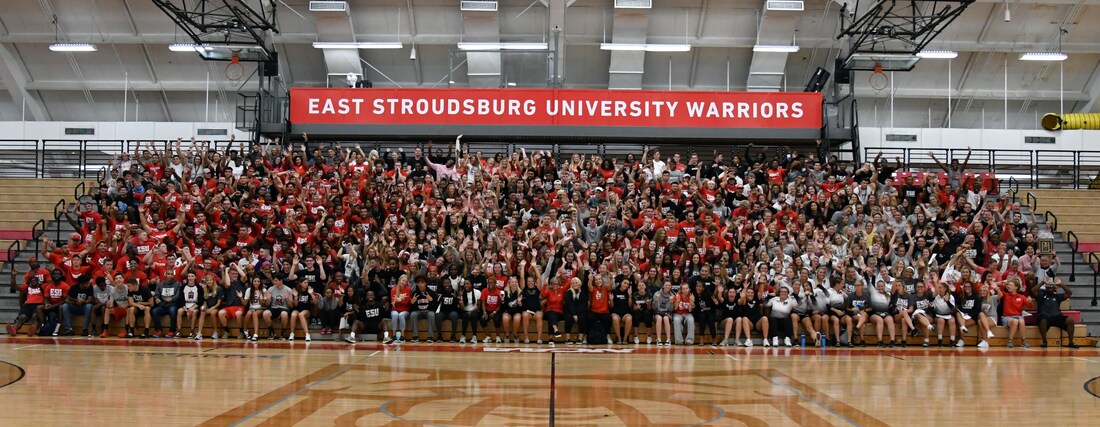


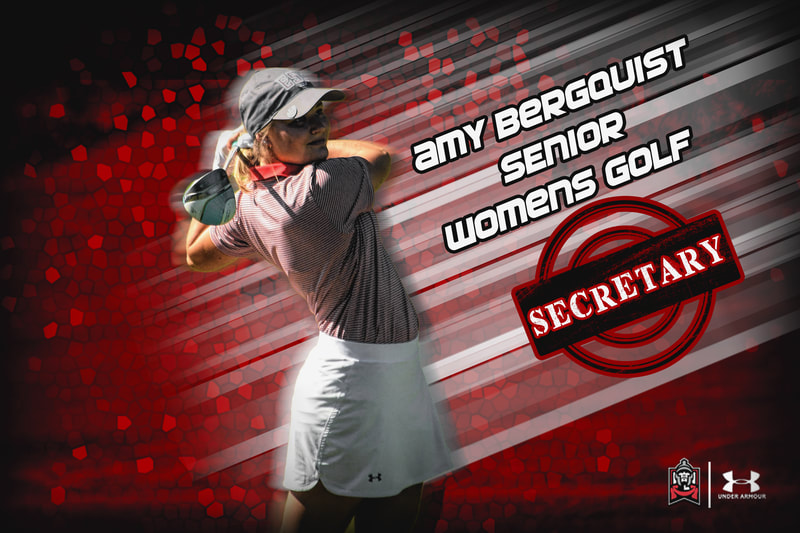
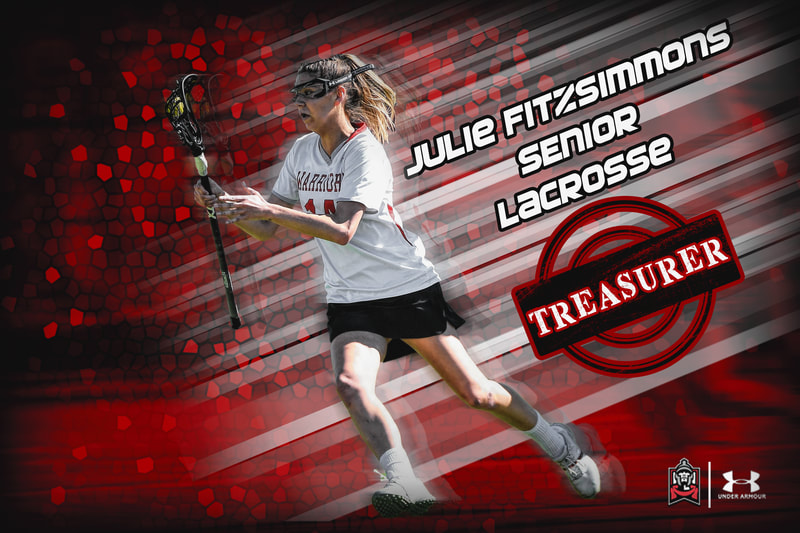
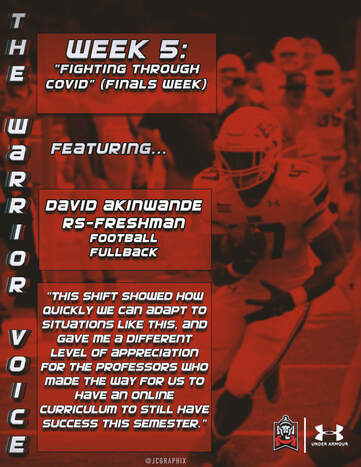
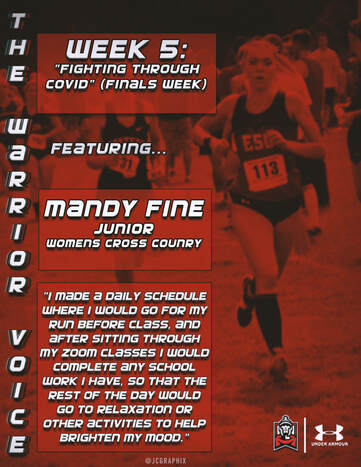
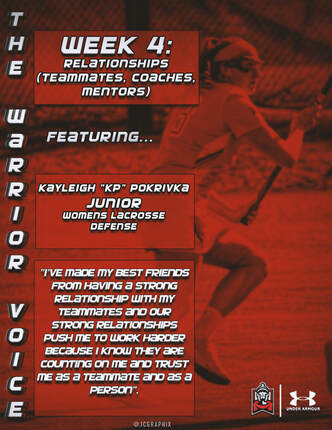
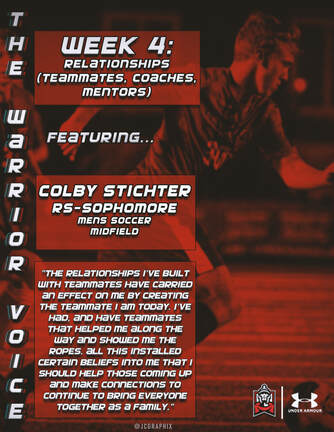
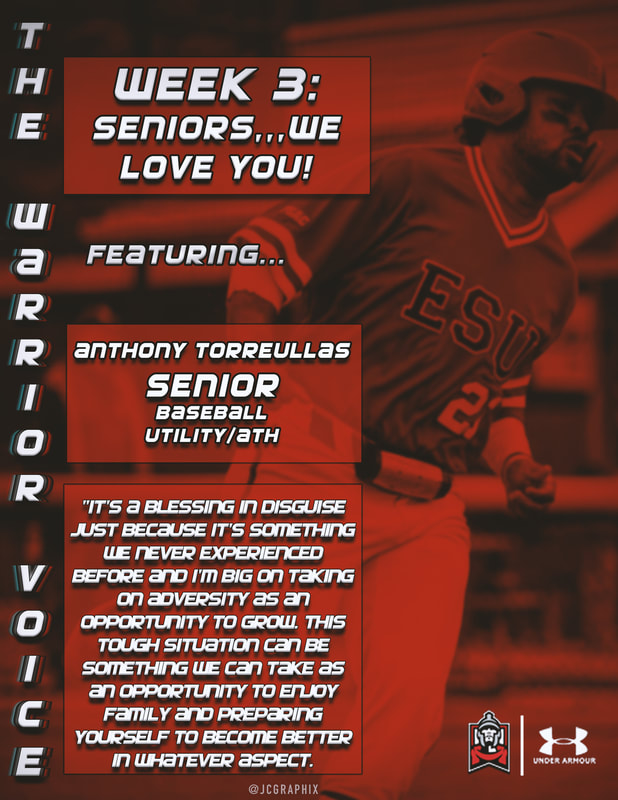
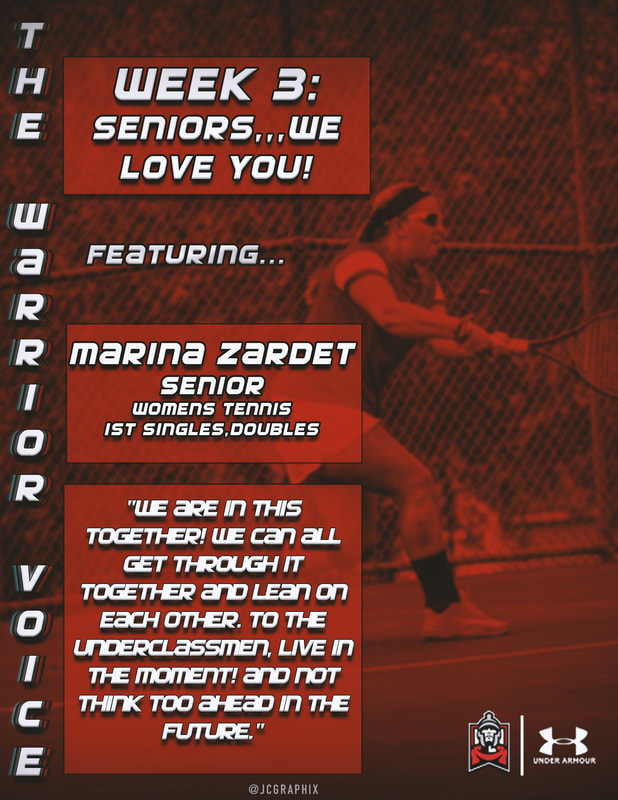
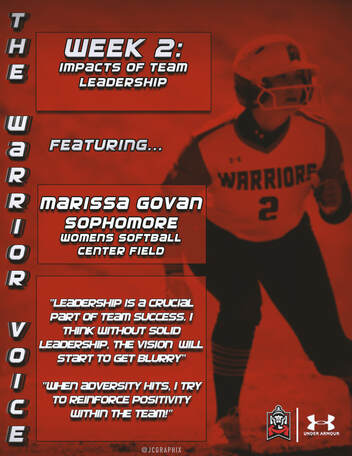
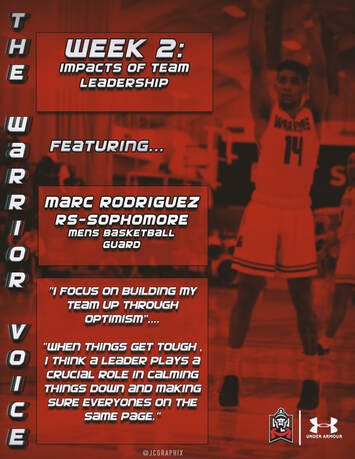
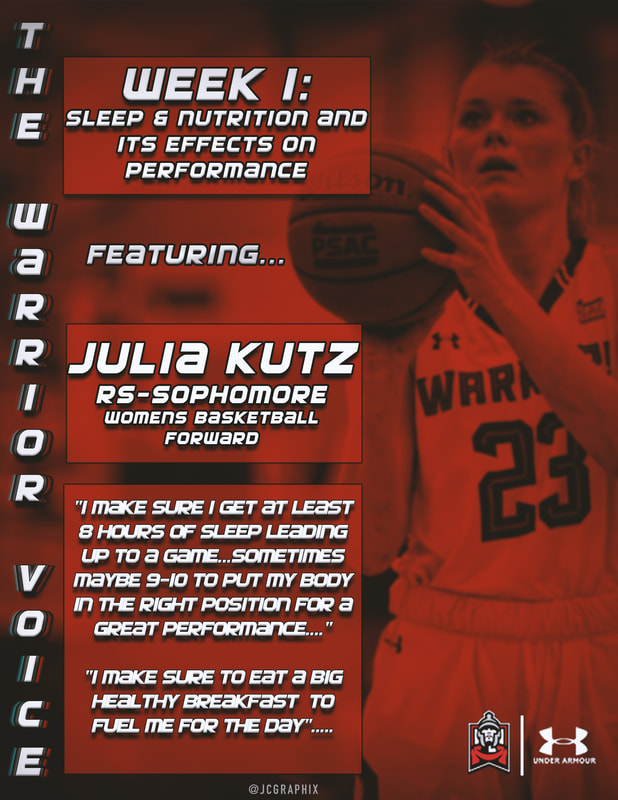
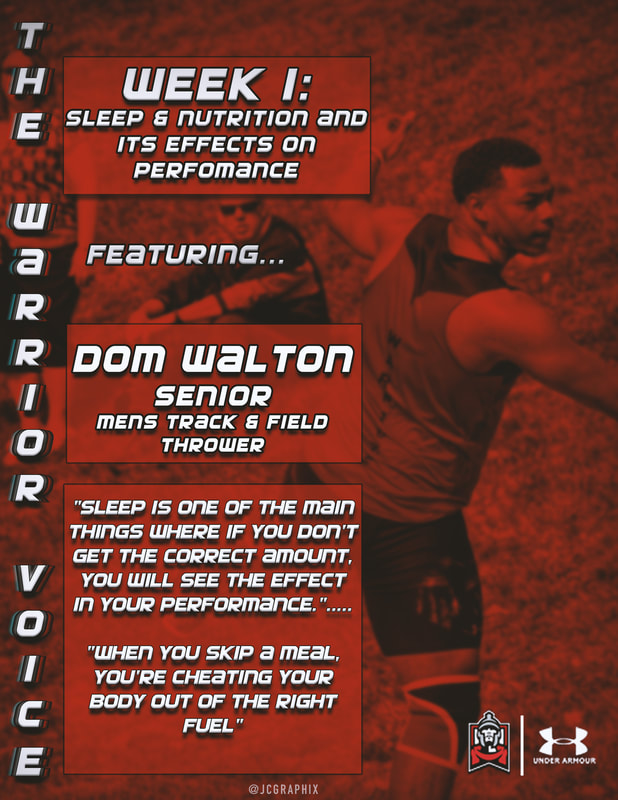
 RSS Feed
RSS Feed
